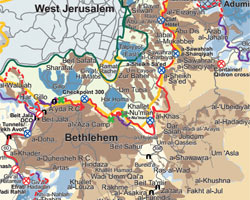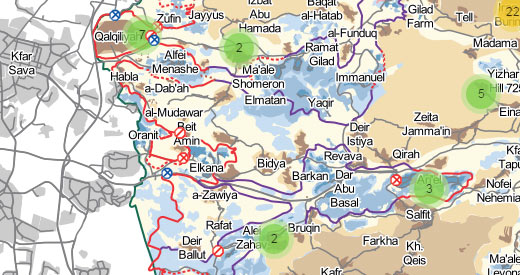With or without flights to Abu Dhabi, Israel annexed the West Bank long ago
 Wednesday, October 28, 2020 at 07:51PM
Wednesday, October 28, 2020 at 07:51PM https://www.btselem.org/press_releases/20201027_the_annexation_that_was_and_still_is
As part of its normalization of ties with the United Arab Emirates, Israel has decided, at least for the time being, not to officially annex the West Bank – and remain with the de-facto annexation already in place. The uproar over official annexation subsided, the international community has breathed a sigh of relief, and the Palestinians remain oppressed under occupation, while Israel continues to establish facts on the ground without paying any price.
In “The Annexation That Was And Still Is”, a new position paper issued today, Israeli human rights organization B’Tselem describes how without formal annexation, Israel treats the West Bank as its sovereign territory, acting unilaterally for decades to establish and perpetuate Israeli control over the area. The paper details the many ways in which the West Bank territory has already been annexed de-facto and provides key examples of how Israel continues with its policy even now, after the possibility of official annexation has been shelved.
Supporters of the annexation, and some detractors, maintain that an official annexation will release Israel from the restrictions imposed on it by international law, allow it to apply Israeli law in the West Bank and help it to achieve its goals. Yet even today, for over 50 years, Israel has not considered itself beholden to the provisions of international law – including the basic tenets of the law of occupation designed to protect the Palestinians.
The reality Israel has created in the West Bank cannot be defined as temporary – contrary to the tenets of the laws of occupation. By engineering the space, Israel has radically changed the map of the West Bank to suit its interests, creating contiguity for the settlements and pushing Palestinians into scores of isolated, crowded enclaves.
More than 400,000 Israelis now live in the West Bank in nearly 250 settlements (excluding East Jerusalem – the only formally annexed part of the West Bank). Many Israeli laws have been extended to settlers and settlements through parliamentary legislation and military orders, turning them into Israeli “islands” isolated from their Palestinian surroundings. Settlers benefit from nearly all of the protections, rights and funding afforded to Israelis inside the country’s borders. A third generation is growing up in these settlements, and most Israelis do not remember a time when they did not exist.
In addition to building settlements, Israel has undertaken a wide range of infrastructure projects to service them, including paving roads. Highway construction projects underway throughout the West Bank include, for example, doubling the section of Route 60 known as the Tunnel Road and paving a bypass road around the Palestinian village of al-’Arrub; constructing the eastern Jerusalem beltline and the Huwarah bypass road (along Route 60); and expanding Route 55. These projects, costing billions of shekels, demonstrate Israel’s long term intention to retain control over the West Bank without formally annexing it and to expand the settlement enterprise. Israeli NGO Peace Now recently revealed that with Israel’s declaration to establish 5,000 new housing units in the West Bank, issued after the threat of formal annexation was dropped, 2020 became the highest year on record in terms of construction in settlements.
In addition to significant investment in settlements, Israel works to minimize Palestinians’ presence by confining them to the crowded, detached enclaves it has allocated them. Any development outside the enclaves, i.e. the majority of the West Bank’s territory and the parts where its development potential lies, has been banned by Israel and strictly enforced. According to B’Tselem’s figures, from 2006 to 30 September 2020, Israel demolished at least 1,623 Palestinian housing units in the West Bank (excluding East Jerusalem). The demolition left at least 7,068 people, including at least 3,543 minors, homeless. Also, from the beginning of 2012 to 30 September 2020, the Civil Administration demolished 1,804 non-residential structures in the West Bank (including fences, water cisterns, storage rooms, agricultural structures, businesses and public buildings).
New military legislation has enabled Israel to ramp up home demolitions in recent years. According to Civil Administration’s data, in 2020 alone it confiscated 242 prefabs, as opposed to six in 2015. In 2019, the Civil Administration confiscated some 700 tractors and diggers and uprooted some 7,500 trees in Area C. Its actions also decreased international aid projects for Palestinians in Area C to a mere 12 in 2019, compared to 75 in 2015. These projects included setting up prefabs and laying infrastructure.
Despite the international laws of occupation, Israel violates Palestinians’ rights daily by upholding a strict military regime. Israeli security forces have killed thousands of Palestinians in many instances in which their lives were not in risk and without any justification. In the last decade alone, 427 Palestinians were killed by Israeli security forces in the West Bank. The military restricts Palestinians’ freedom of movement at will and disrupts their lives. Soldiers invade Palestinian homes every day – and every night – waking up the entire household with no need to provide a search warrant or any explanation. Israel also places a blanket ban on Palestinian demonstrations in the West Bank, restricts freedom of expression in the press and on social media and prohibits associations, even when they are strictly social. Thousands of Palestinians are prosecuted every year under the military legal system – a system under which they are almost always convicted.
The possibility of formal annexation shook the international community, which took the rare step of threatening concrete measures against Israel. Now it seems we’re back to “business as usual” – the intolerable reality euphemistically known as “the status quo.” Israel has chosen to take formal annexation off the table for the time being, in return for being let off from international pressure. The global community has welcomed Israel back with open arms – legitimizing its continued policy of dispossession with no price.
The international community should have reached the opposite conclusion. A key factor in Israel’s about-face on the issue of annexation was recognition of the significant potential cost to its international standing. Again, making polite requests and voicing concern has proven ineffective, unlike real leverage. Temporarily shelving the idea of formal annexation must not be a license to carry on as usual. The international community must recognize its responsibility, power and capacity to take immediate action against the occupation and the de facto annexation already in place – in order to create a future of liberty and equality for everyone living between the Mediterranean and the Jordan River.
 APJP |
APJP |  Post a Comment |
Post a Comment | 

Reader Comments